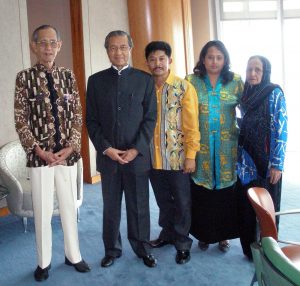Syair Boria: a review December 6, 2018 – Posted in: Reviews – Tags: Abdullah Darus, Biography, Boria, Kampung Jawa Baru, Non-fiction, Penang

Abdullah Darus (left) with the 4th and now 7th prime minister of Malaysia, Tun Mahathir
Syair Boria, Biografi Abdullah Darus problematized the origins of boria, a performing art form peculiar to Penang to Persian Syiah beginnings arising from the murder of Hussain, the grandson of the Prophet Muhammad (pbuh) in Karbala, Iraq in the 7th century, to mark the occasion. The practice came to Penang with the arrival of sepoy soldiers from the 21st Madras Regiment.
Speculations abound as to its origins that boria is derived from boriah or mat in Hindi used by the Madras troops in their show or borai’e yet another Hindi word which means mad or binge implying unrestrained excessive self-indulgence or from the bori Gujaratis settlers who set up the Asraqah between Jalan Masjid and Chulia Street. The remnant of the building still stands today, at the mentioned place, a testimony of its previous significance.
Indication are all the derivatives roll back to Persia, Iraq and India suggesting a foreign issue in an attempt to totally discredit boria which was eventually banned by the Islamic religious authorities at the behest of the British colonial rule in the early decades of the 20th century for its association with ‘secret societies’, moral corruption and decadent youth culture detrimental to the wholesomeness of the Muslim community and public order.
Challenged, boria transformed itself from a religious orientation to entertainment outlet in the 1940s, replacing scriptures for hikayat (metrical romances), beloved bangsawan tropes, historical and western themes, social commentaries as well as a vehicle to stoke up the spirit of national independence. Sponsored by philanthropic Muslim and Straits Chinese patrons, it spawned the mushrooming of boria troupes in practically all village locales.
One of the leading proponent of boria is Abdullah Darus born at a time when boria was already a religious taboo. But boria was in his blood as his grandfather and his father before him were themselves practitioners of the art. His interest in the subject coincides with the revival of boria in the 1940s when he was a youth. By 1948 he was already composing syair for boria groups from Boria Kampung Jawa Baru to KESUKA, abbreviation for Customs Sports Club Boria. Thus far he has composed 3,000 syair stanzas, a feat in itself. Syair is a form of traditional Malay poetry that is made up of four-line stanzas or quatrains, either narrative or didactic poems, employed to convey ideas.
Aside from the spiritual shift, a notable change in boria according to Abdullah was in the costume, throwing out the Arab wardrobe for more modern and western garb while introducing the Latin American sash in the process. Another marked change was the downsizing of the boria troupes from platoon to squad, making it more manageable, dynamic and flexible.
In spite of all these trappings, the days of boria are numbered if it fails to capture new blood, creativity and imagination. Gone are the times when each hamlet would be ashamed if they were without a boria troupe; gone too are its patrons and its audience, its entertainment appeal crossing cultural and class boundaries. Abdullah describes the state of boria as in a stupor. In his own words, ‘hidup segan, mati tak mahu’ (shy to live, yet not wanting to die). He called on government agencies and the media to join hands in saving the endangered boria from extinction.
In light of this, the publication of Abdullah Darus’s biography is timely in documenting a dying art form and compiling his syair in a book though that in itself will not lend itself to rescuing boria from the gallows as that would require more than the printed word; it would entail inspiration, motivation and passion which unfortunately is wanting.
Syair Boria, Biografi Abdullah Darus by Sohaimi Abdul Aziz and Rosmah Derak published by Persatuan Karyawan Pulau Pinang, 2010, is available from Areca Books. Please click here for more information, or to purchase.
Abdullah Darus passed away in March 2010. Al-fatihah.
